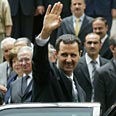
_a.jpg)
Senior IDF officials urge Olmert to talk to Assad
While Syrian military arms itself with improved missiles and units stationed opposite Golan Heights are reinforced, Israeli officials fear Damascus is preparing for war. Jerusalem conveys calming message to Syrian president, saying Israel is not interested in conflict. Top IDF officials believe time is not in Israel's favor, negotiations with Syria must not be postponed
The IDF is viewing with concern what could be interpreted as Syrian preparations for a war with Israel.
Second front from Lebanon
IDF officials estimate that if a conflict breaks out between Israel and Syria, Hizbullah will rush to launch a second front in Lebanon. According to the estimation, the Iranians will aid the Syrian army with weapons and ammunition and possibly in other ways.
Hizbullah has received from Syria almost its entire arms arsenal. If a war breaks out in the north this summer, Hizbullah would be able to launch missiles which would reach central Israel from its posts north of the Litani River.
UNIFIL and the Lebanese army have distanced the Shiite organization from its posts on the Israeli border and from its bunkers in the open area south of the Litani, but they are not preventing it from returning to the villages along the border.
In order to prevent a war due to a Syrian misinterpretation of Israel's intentions, Israel conveyed calming messages to Damascus in the past few weeks. Jerusalem asked the Austrian general heading UNDOF, the United Nations' observer force in the Golan Heights, to make it clear to the Syrian government that Israel had no interest in a military conflict with Damascus.
Top IDF officials assume that launching negotiations with the Syrian government on a permanent agreement will make Syria abandon its alliance with Iran and Hizbullah and stop aiding Palestinian and Iraqi terror organizations.
Damascus will then return to what is perceived as her natural place in the region – its alliance with the moderate Sunni countries, Iran's rivals, the Israeli army believes.
Assuming that Iran eventually enters a nuclear era, different ways to deter the Iranians will be examined. The Americans may be forced to station a large permanent force in the Middle East. In such a situation, Syrian's alliance with any of the sides to the conflict will be extremely important.
Senior IDF officials estimate that time is not in Israel's favor, and that Israel should thus not postpone the negotiations with Syria.
The recent round of talks held with the Syrians, when Hafez Assad was the Syrian president and Ehud Barak was Israel's prime minister, made the price clear: The entire Golan Heights.
The Syrians, however, were surprisingly flexible on the issue of demilitarization. They agreed that for every kilometer demilitarized on the Israeli territory, 6 kilometers will be demilitarized on the Syrian territory. There is no chance that Assad Jr. will give Israel more than what it was offered by Assad Sr.
Olmert still undecided
Prime Minister Ehud Olmert is delaying is decision on the issue. Three Israeli prime ministers – Rabin, Netanyahu and Barak – launched negotiations with Syria, promising Damascus in practice all of the Golan Heights, but still failed to reach an agreement.
Olmert is not certain that the Syrians are interested in an agreement, but believes that they are seeking international authorization on the backdrop of the murder of former Lebanese Prime Minister Rafik Hariri. Israel may be dragged into talks which will entail a harsh argument among the Israeli public opinion and will fail to yield results.
The question of negotiations with Syria will be one of the main issues raised during Olmert's meetings with US President George W Bush and Secretary of State Condoleezza Rice on June 19.
Prime Minister Olmert said Sunday morning in response to the report, "I would like to hear exactly when officers urged me to negotiate with the Syrians."
Vice Premier Shimon Peres also addressed the issue during a Kadima faction meeting, saying, "Who are the military people urging the prime minister to negotiate? What is happening with us is in fact an invitation to slam the government in the newspapers. It is impossible for each person to run their own policy."
Deputy Prime Minister Eli Yishai said, "It is obvious that there are thing not everyone knows and not everyone should say. We have to hear what the Syrians are saying. I have been briefed on the details as part of my job, but there are additional things that may be taking place under the surface.
"Even if there are developments, we must not make any declarations before being aware of everything. I do not see anything beyond Assad's declarations. He has not repented."
Ronny Sofer contributed to the report















